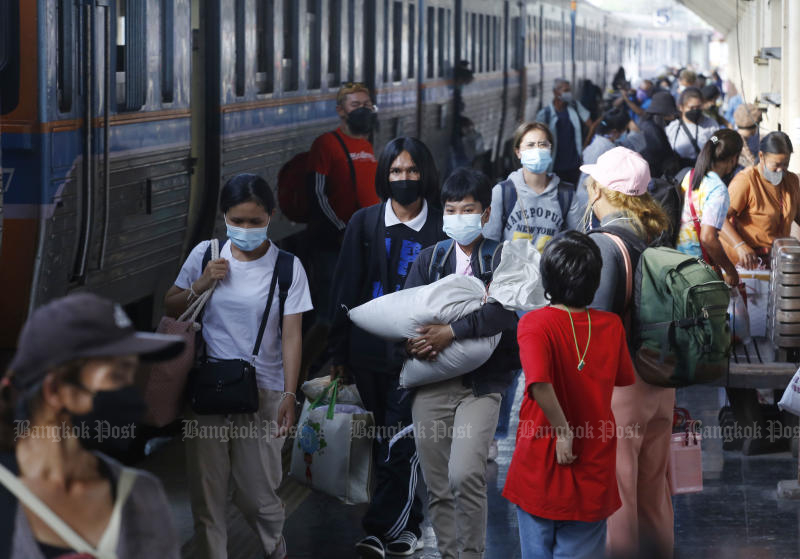
The government has asked state agencies and private companies to allow staff to work from home for at least 14 days as Omicron infections soared to more than 1,500 cases nationwide as of Jan 1.
Despite the surge, the situation remains under control without any severe cases caused by the new variant, health authorities said.
Government spokesman Thanakorn Wangboonkongchana said on Sunday that state agencies and private companies are being encouraged to allow their staff to work from home to prevent further spread of the highly transmissible Omicron variant.
Prime Minister Prayut Chan-o-cha instructed state agencies to monitor the Omicron situation closely to prevent any further major clusters of Omicron infections developing such as that in Kalasin which logged a total of 244 cases (scattered over several provinces) as of Sunday, Mr Thanakorn said.
He said those who had returned to Bangkok from the provinces via the Mor Chit bus terminal and Hua Lamphong railway station can get antigen tests free of charge.
The service is provided in a collaboration of the Public Health Ministry and the Transport Ministry.
Dr Kiattiphum Wongrajit, permanent secretary for public health, said Omicron infections have increased as predicted, though there have been no severe cases.
''Generally, patients are concerned about the worst effects such as deaths if they get infected. But as long as infected patients have mild or no symptoms and develop immunity, this should be okay,'' he said.
However, the Public Health Ministry will assess the situation again today before presenting any further measures to help curb the spread to the Centre for Covid-19 Situation Administration on Friday, Dr Kiattiphum said.
"In sum, the Omicron variant is spreading. But it has not caused any severe symptoms yet and remains under control," he said.
Dr Supakit Sirilak, director-general of the Department of Medical Sciences, said Thailand logged a total of 1,551 Omicron cases over 47 provinces between Nov 1 last year and Jan 1.
Of them, 779 were arrivals from abroad and 772 were local transmissions.
Bangkok accounted for 395 cases, followed by 195 in Kalasin, 148 in Chon Buri, 125 in Phuket, and 119 in Roi Et, Dr Supakit said, adding that the spike in cases was in line with a prediction by health authorities that more cases would be detected after the New Year holiday.
Agencies have been urged to allow as many staff as possible to work from home for two weeks during which the government will assess the situation, Dr Supakit said.
People should also follow ''Universal Prevention'' precautions such as wearing masks, and maintaining safe distancing to protect themselves against the spread of the virus.
Chon Buri on Sunday logged a total of 442 new cases of Covid-19, the largest in the country, according to the provincial public health office.
In particular, close watch is being kept on Bang Lamung district where 81% infections were confirmed to be Omicron, local health officials said.
A random sample of 79 cases collected by provincial health officials found that 64 were Omicron cases while nine were cases of the Delta variant.
Chon Buri public health office has launched proactive case finding in the district and asked business operators to conduct antigen testing on staff and set up screening checkpoints to look for and isolate infected people.
Restaurants that sell alcoholic drinks in Pattaya or Bang Lamung have also been ordered closed, except those which conduct antigen testing on staff and patrons.
Dr Opas Karnkawinpong, director-general of the Department of Disease Control, expressed concern about transmissions in Chon Buri, saying the eastern province has many residents, and most are factory workers.
After New Year when those workers return from their home provinces to work, factories may continue to operate, but they have been urged to conduct antigen testing on workers.
Health officials are also monitoring another infection cluster in Ubon Ratchathani which is spreading rapidly, with some 304 new cases recorded on Sunday.
This cluster was detected among people who visited pubs and restaurants, similar to the Kalasin cluster, Dr Opas said.
